 A group of Rugby League supporters has written a letter to the RFL expressing their concern about the way the game is run and its perception among the wider public.
They have asked Totalrl.com to publish the contents of their letter and we are happy to do so, which we have done below.
We are Rugby League fans, passionate and loyal towards our s
A group of Rugby League supporters has written a letter to the RFL expressing their concern about the way the game is run and its perception among the wider public.
They have asked Totalrl.com to publish the contents of their letter and we are happy to do so, which we have done below.
We are Rugby League fans, passionate and loyal towards our s Fans question RFL & Super League competence
 A group of Rugby League supporters has written a letter to the RFL expressing their concern about the way the game is run and its perception among the wider public.
They have asked Totalrl.com to publish the contents of their letter and we are happy to do so, which we have done below.
We are Rugby League fans, passionate and loyal towards our s
A group of Rugby League supporters has written a letter to the RFL expressing their concern about the way the game is run and its perception among the wider public.
They have asked Totalrl.com to publish the contents of their letter and we are happy to do so, which we have done below.
We are Rugby League fans, passionate and loyal towards our s 